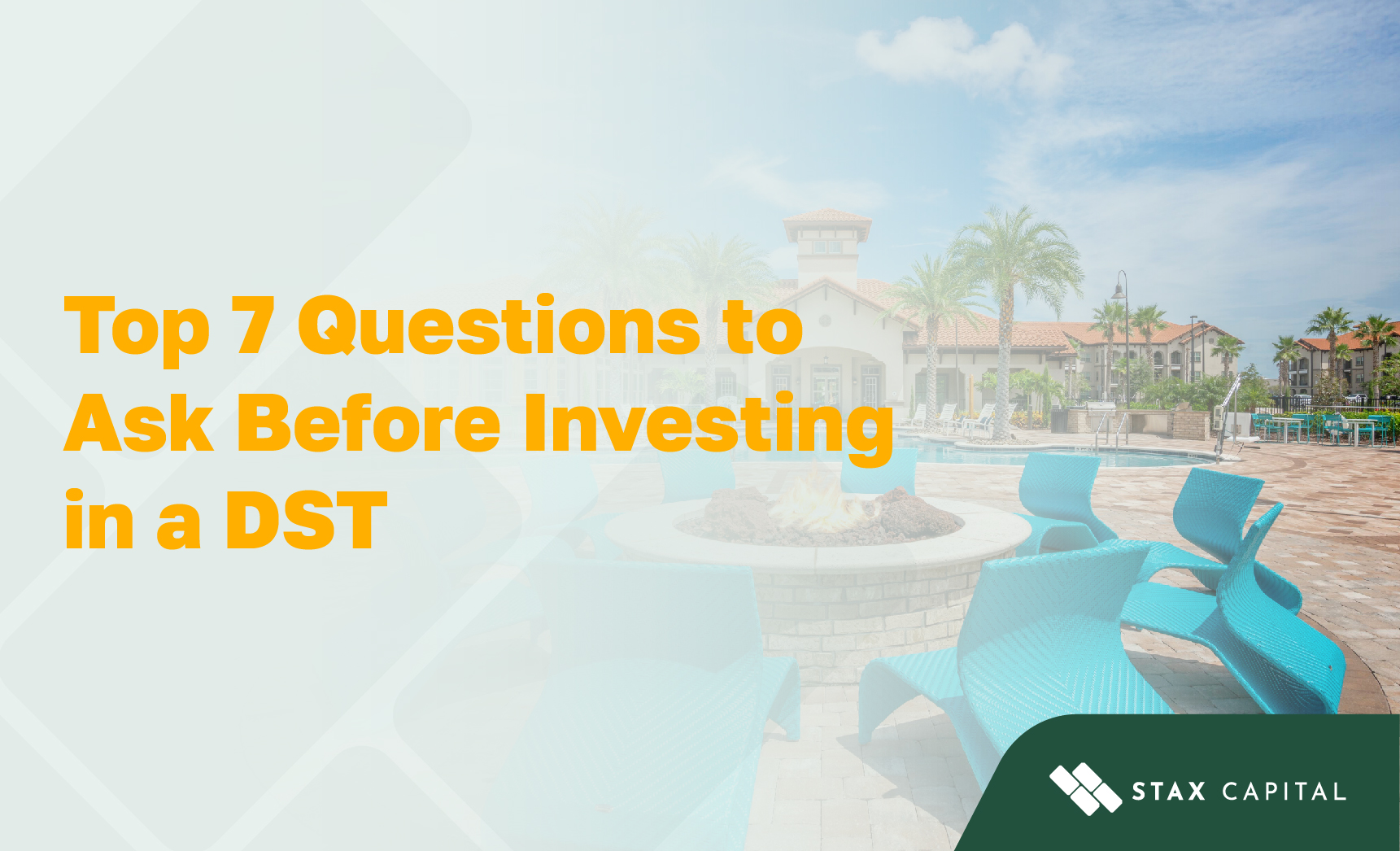Investing in Delaware Statutory Trusts (DSTs) - Things to Consider

Delaware Statutory Trusts (DSTs) are a popular real estate investment vehicle, offering passive real estate investment opportunities with potential tax benefits. However, before investing thousands of dollars into a DST investment, it's essential to understand key factors such as investor eligibility, tax treatments, investment objectives, and DST risks, especially for those considering a DST 1031 exchange.
If you are looking to invest in a DST or are already exploring DST offerings, having the right information is critical for making informed investment decisions. Let’s break down the essential aspects of DST investing that every real estate investor should consider.
Accredited Investor
The United States federal securities laws allows only individuals considered as accredited investors to participate in certain Investments. A Delaware Statutory Trust is one such platform that the Securities and Exchange Commission (SEC) regulates, limiting participation to qualified investors. These regulations aim to protect average real estate investors from losses associated with alternative investments not listed on public markets.
In 2020, the SEC updated the accredited investor criteria, incorporating individuals with relevant professional knowledge and certifications. Before this amendment, eligibility depended on net worth, annual income, and asset value. The SEC ensures that DST investments are accessible only to sophisticated investors with financial acumen and a strong understanding of investment strategies.
What are the financial requirements for accredited investors? This depends on if you are an individual, couple or an entity.
Individuals: Persons with income exceeding $200,000 for two most recent years and expected to at least remain in this income band for the current year; also, individuals with single or joint net worth (for couples) exceeding $1,000,000 (excluding primary residence) can be classified as accredited investors.
Couples: To be classified as accredited investors, couples with joint income are required to have income exceeding $300,000 for two most recent years and expected to at least remain in this income band for the current year.
Entities: Specific organizations or entities owned by accredited investors can be allowed to invest in sophisticated financial assets and instruments. Such entities need to have total assets in excess of $5,000,000. Such organizations may include but are not limited to banks or any savings and loan association, a registered broker or dealer, an insurance or investment company or a business development company.
If you are considering investing in a DST, you have to meet the criteria set by the SEC and also maintain this classification. Qualification as an accredited investor allows you to purchase ownership interest in a Delaware Statutory Trust directly or by depositing your 1031 exchange proceeds into this investment vehicle.
Risk Appetite
Delaware Statutory trusts are commonly known for the advantage of qualifying as 1031 exchanges. DSTs provide an opportunity for investors to explore potential passive real estate investment benefits and possible tax deferral advantages. However, they do not come without risks. Some risks include illiquidity, limited control over investment properties, and the speculative nature of real estate investments. DSTs do not provide guaranteed returns, and their performance depends on real estate market conditions.
Since DST investing is not publicly listed and lacks required disclosures, real estate investors must evaluate their risk appetite. Those who prefer passive investment opportunities with long-term benefits may find DSTs suitable, while risk-averse investors may want to reconsider. DST investors should have surplus funds and a robust investment portfolio to mitigate potential losses.
Portfolio composition
For accredited investors looking to diversify their real-estate investment portfolio and add a different asset in their portfolio mix, DSTs offer an opportunity to invest in commercial real estate, residential properties, and income-producing real estate. Though diversification does not eliminate risk, it remains an effective investment strategy for managing risk exposure.
Through investments in Delaware Statutory Trusts, you can have access to a wide range of property investments such as commercial real estate, retail and residential buildings and also industrial buildings.
It is important to note that DSTs are complex alternative investments and including them into your investment portfolio may require not only the professional services of your financial advisor, but also experts such as accountants and tax advisers.
Investment objective
Given their structure, DST investments are best suited for long-term investment strategies. Unlike publicly traded stocks, DST interests cannot be quickly liquidated. There is no secondary market for selling DST ownership interests, meaning investors must hold their positions for an average of 5 to 10 years.
A key advantage of DST investing is its role in estate planning, allowing real estate investors to defer capital gains taxes over extended periods. Those aiming for tax-deferred long-term ownership of real estate assets can consider DSTs as a viable investment option.
Regulations and Tax laws for DSTs
Delaware statutory trusts are normally set up as pass-through entities, as regards tax treatment, this indicates that the return on investments are taxed in the hands of the investors. For federal tax purposes, the classification of a DST as a business or a trust is dependent on the power awarded to trustees to carry out activities such as acquiring and disposing of property, making structural modifications to the property, renegotiating leases or debt, investing cash for profit or collecting and distributing income.
The notable tax regulation governing investments in DSTs makes this investment platform eligible for 1031 exchanges. This compelling feature enables accredited investors to defer taxes on capital gains from real estate property sales. The 1031 exchange through DSTs provides an avenue for investors to reinvest their capital gains from sale of existing property into like kind properties that qualify for tax deferral. Real estate investors are able to purchase ownership interests in institutional quality properties for a fraction of the cost as investors funds are pooled in the DST.
In terms of legal structure, DSTs operate as limited liability structures offering protection to associated beneficial owners, trustees, managers. The liability protections for beneficial owners are similar to stockholders of a private corporation, investors or trustees cannot be held liable to third parties for operations of the DST. As such, creditors are not able to seek remedies on investments in DST properties.
Final Thoughts on Investing in DSTs
Ensure that you understand the sophisticated aspects of Delaware Statutory Trust investments. They are definitely not risk proof, neither do they guarantee returns on investments. If DSTs fit into your overall investment strategy as an accredited investor, then you can utilize them as part of your investment portfolio. However, it is recommended to always evaluate your portfolio mix and rebalance your assets if needed, real estate investments inclusive.
Got questions on investing in DSTs, you can contact the Stax Capital team for robust information on investment options and strategies.



Share: